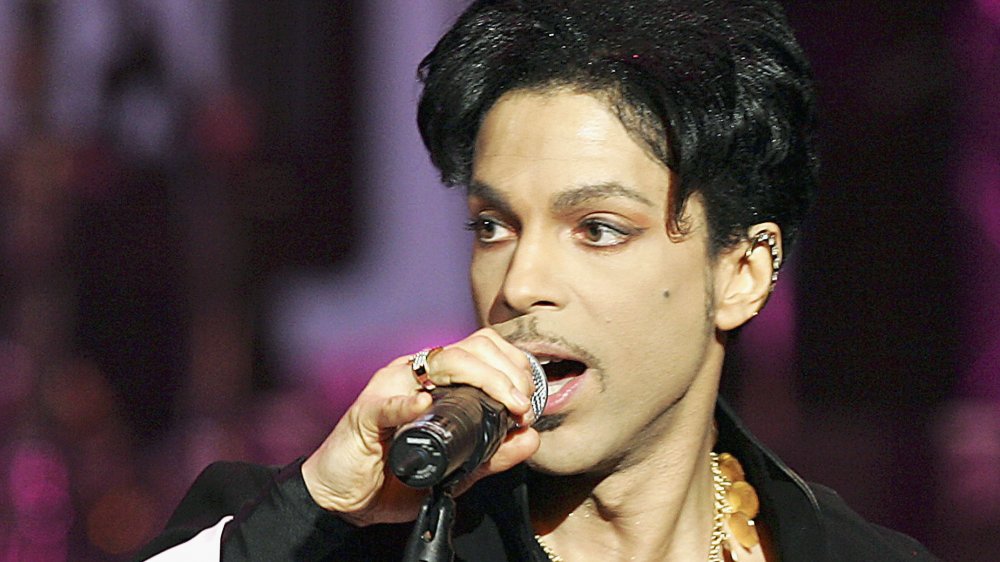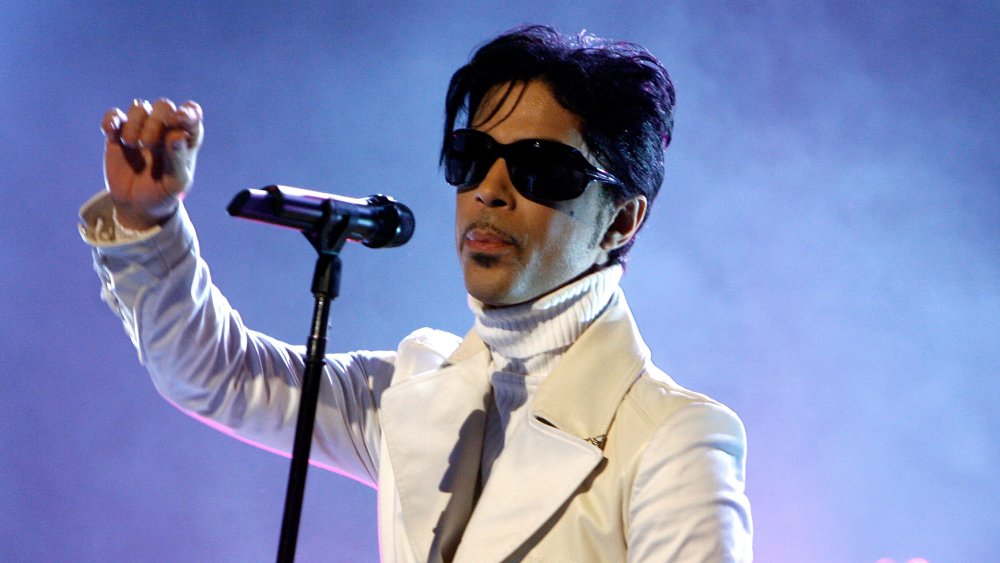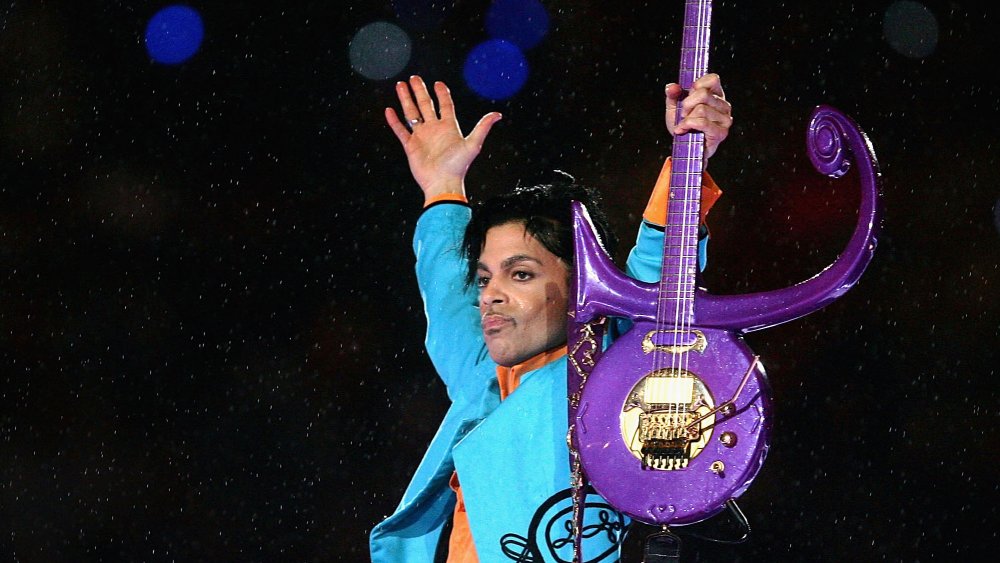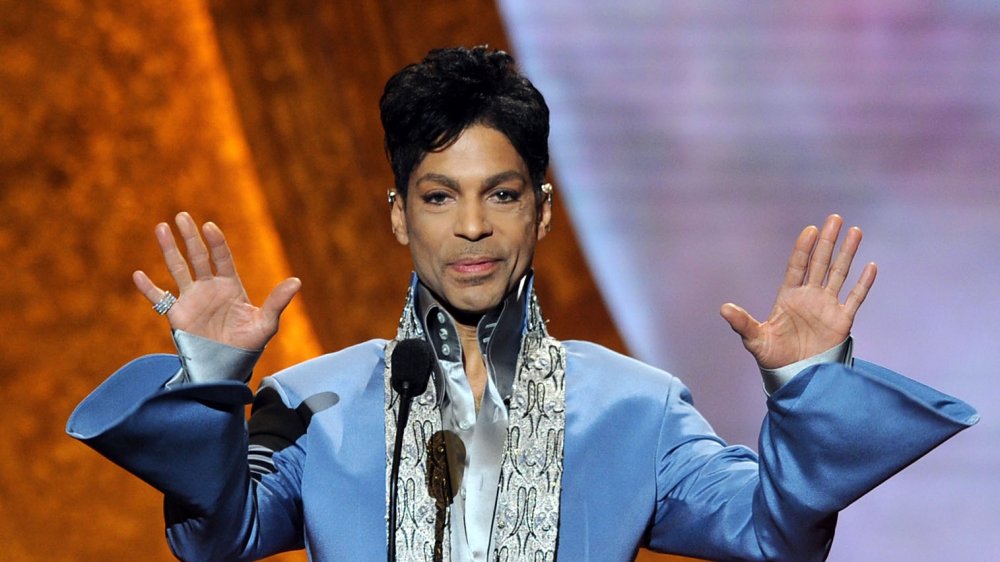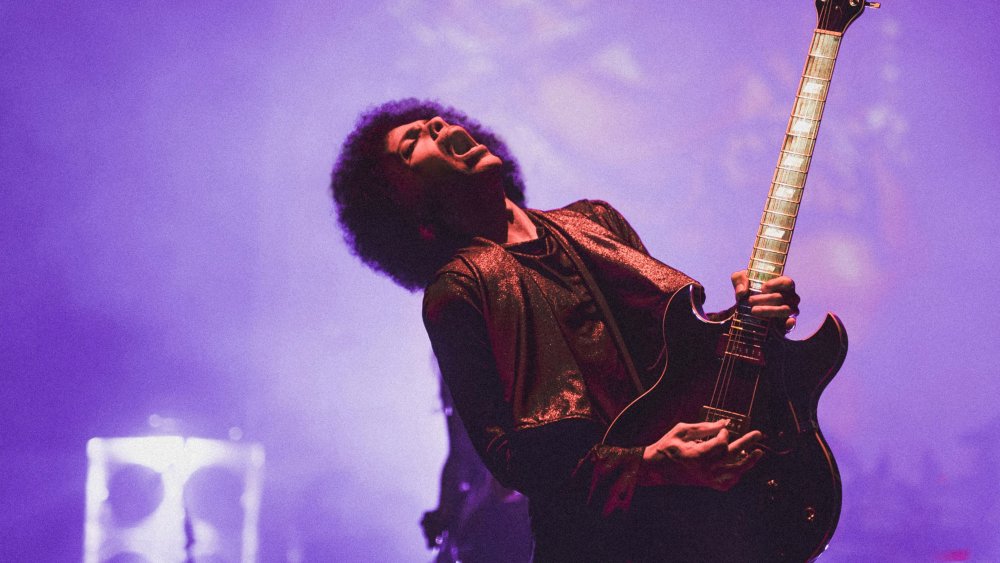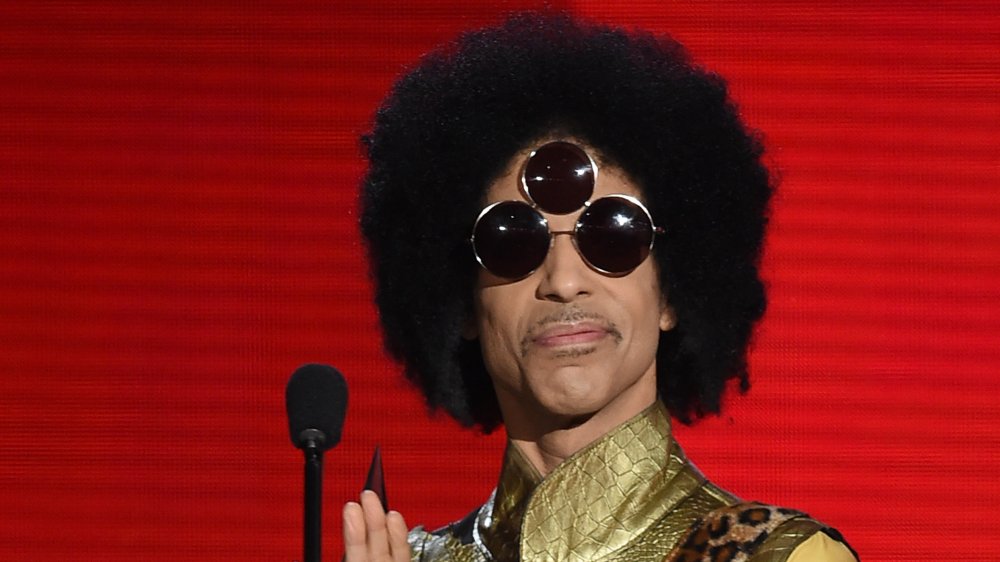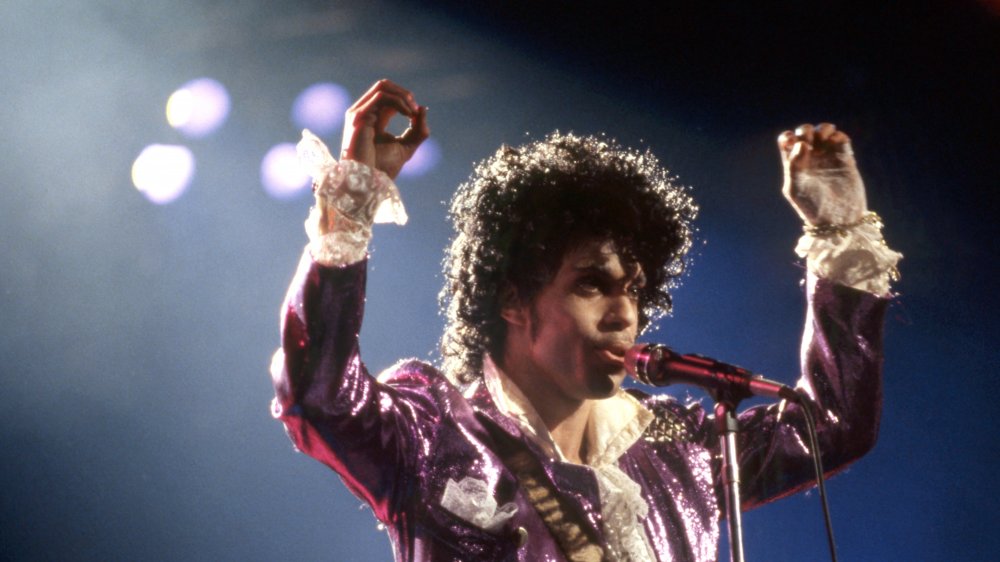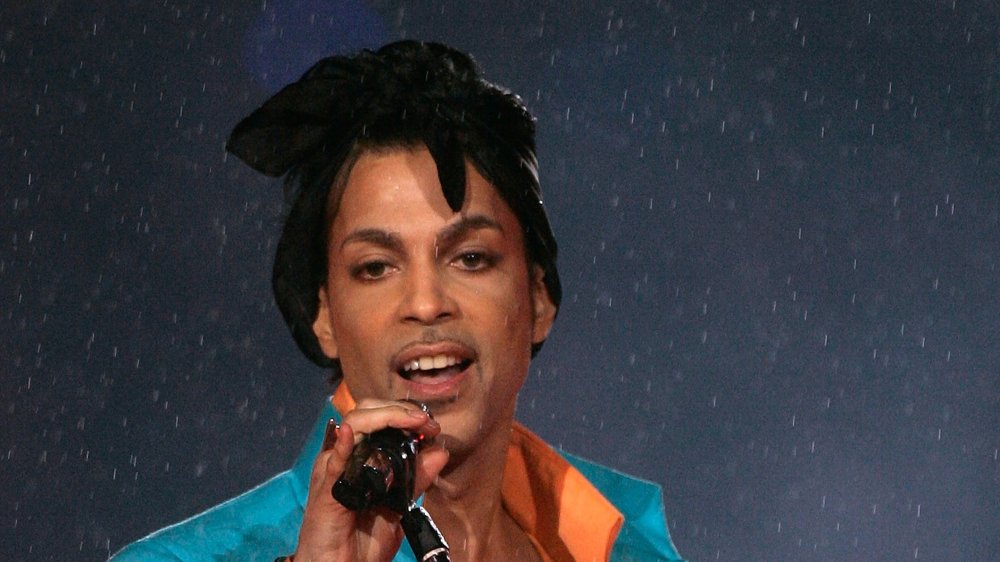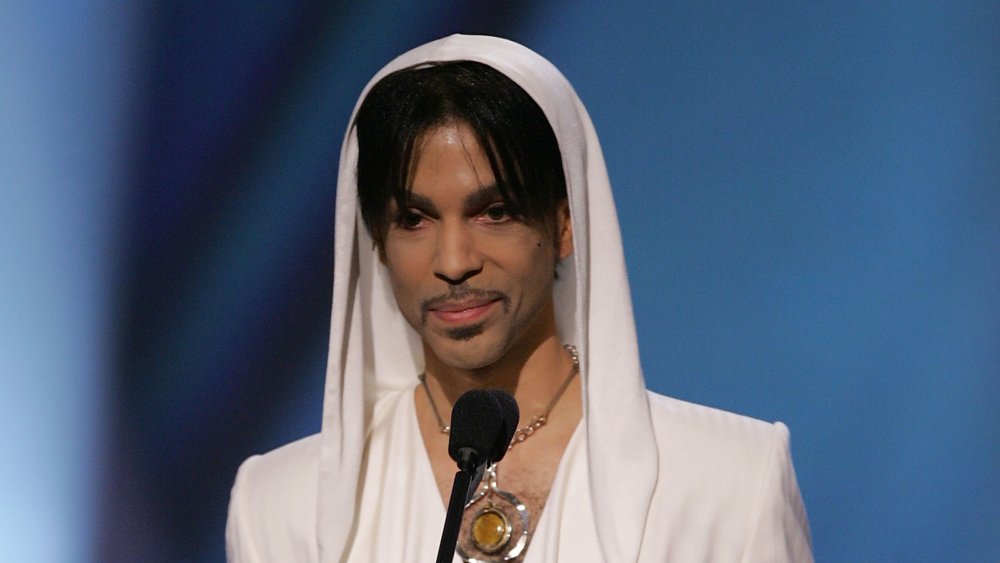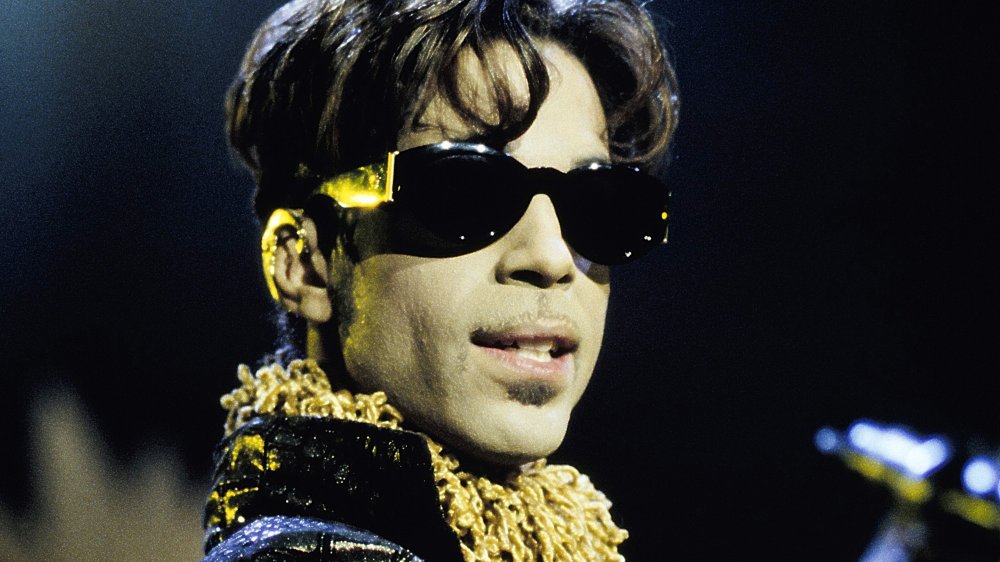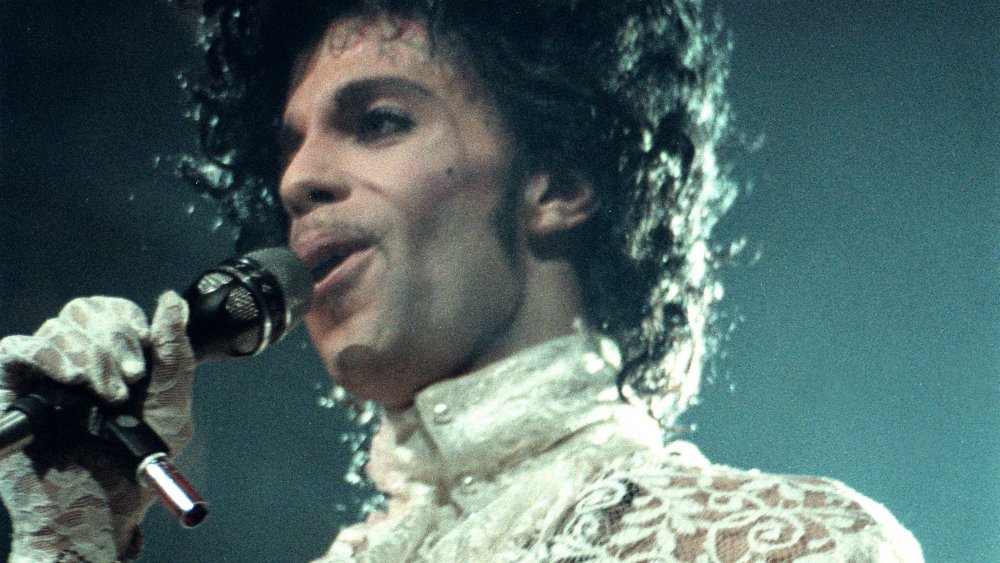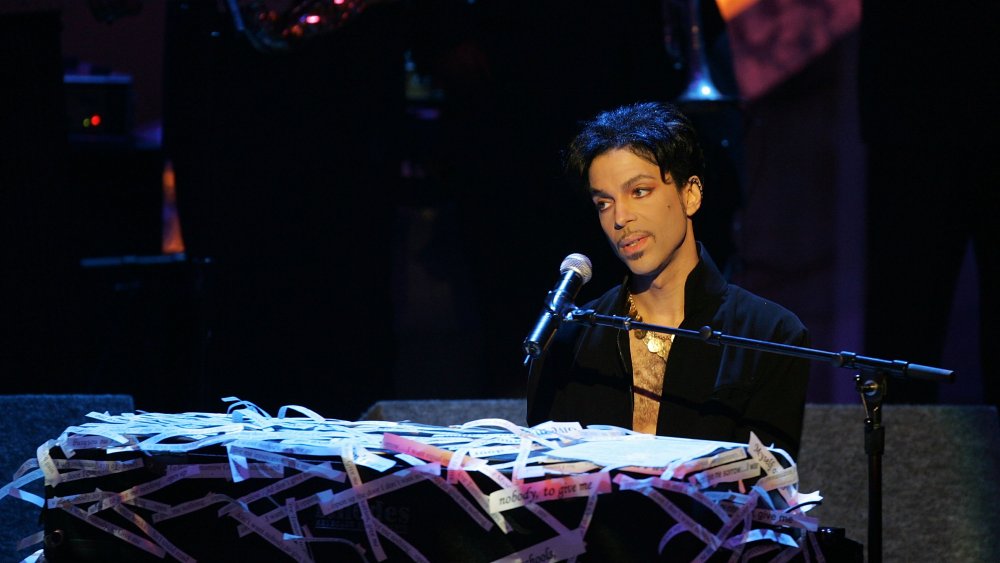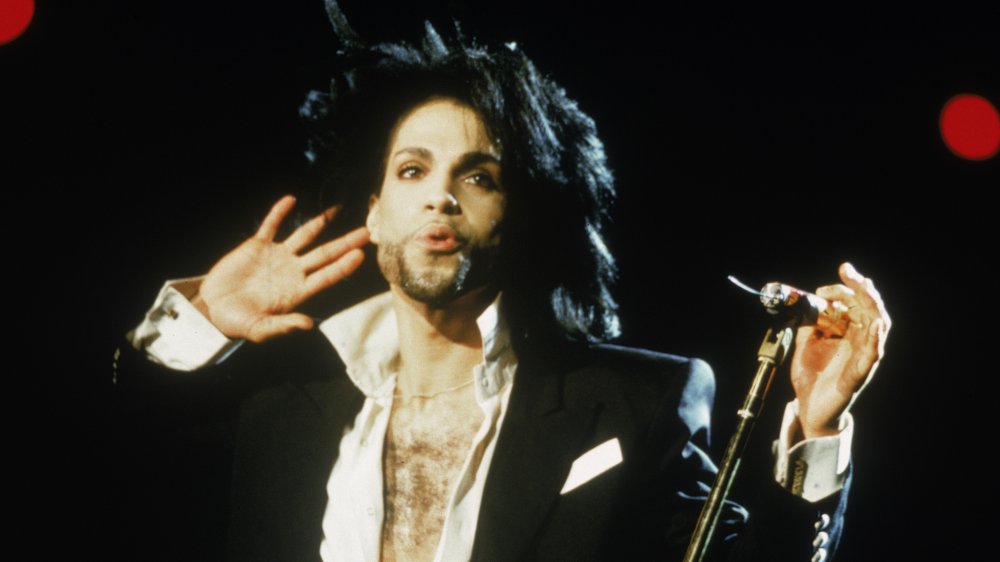What The Last 12 Months Of Prince's Life Were Like
Music sensation Prince was known for his perpetual charisma, his androgynous style, and most of all, his prodigious mastery of the guitar. The superstar wasn't afraid of experimenting or using falsetto to make an impact. Moreover, Prince didn't believe in restricting himself to a particular genre and dabbled in everything including pop, hip hop, R&B, rock, and soul. Prince also wrote and recorded prolifically — he released as many as 39 studio albums in his lifetime. Experts estimate that he could have composed thousands of songs.
This is because Prince often chose to experiment by releasing songs under pseudonyms and handing off popular tracks to other entertainers — "Manic Monday" went to the Bangles and "Nothing Compares 2 U" to Sinead O'Connor. The showman started early too: his first music contract was signed when he was just 19. Today, Prince has sold more than 100 million records worldwide, often to critical acclaim. Prince even won an Academy Award for Best Original Song Score for Purple Rain in 1985. He was just 26.
Prince, however, had a tumultuous final year. He passed away on April 21, 2016, at 57, which left fans around the world gutted. Here are some lesser-known stories from Prince's last 12 months.
Prince was still active in the music circuit
Often referred to as a workaholic, Prince was a highly passionate musician who was committed to his craft. In his final year, he was extremely active in the music circuit and was determined to push his limits. According to a piece published in American Music Review, relieved from the financial pressures of a younger artist, Prince was able to spend time making the kind of music he wanted, including forming a new funk-rock group, 3rdeyegirl. That said, Prince did want to stay in the contemporary music scene and chose, uncharacteristically, to collaborate with producer Joshua Welton for his 2015 album Hit n Run Phase One.
While an artist like David Bowie consciously made music that had significant relevance in terms of a sense of finality as he battled cancer, Prince showed no such signs and was as active as ever, remaining socially engaged while making vibrant music and doing a solo tour.
Prince was politically charged
Prince's music was as politically charged as ever in 2015. After the highly-publicized, tragic death of Freddie Gray came to light in April 2015, Prince spoke up by doing what he knew best: writing music. His song, "Baltimore," was a tribute to the moment, with lyrics like "if there ain't no justice, then there ain't no peace." In May 2015, Prince performed the song in Baltimore in a Rally 4 Peace show. The song's official music video had photos from Black Live Matter rallies and news reports on Freddie Gray coupled with footage from his Baltimore concert.
As per American Music Review, the singer avoided prominently featuring himself in the video, allowing the powerful visuals to do the talking. According to former Special Advisor for Green Jobs, Van Jones, who worked with Prince, the singer didn't care about boosting his personal brand while making music about social issues and was more concerned about lending his voice to the cause. Prince told him, "Everything that you want to do that you think will help the [Black] community ... I will help you do it." This is how Jones ended up being a part of Prince's staff. Prince worked with community groups extensively and peppered in live events. Prince clarified he was not looking for recognition. "I don't need any more attention, but I can't be in this world and see all this pain and all this suffering, and not do something," the musician said.
Prince stepped away from streaming services
In an unexpected move, Prince chose to remove himself from music streaming platforms such as Spotify, YouTube, and Apple Music in 2015. He only spared Tidal and was hit with lawsuits from streaming platforms for choosing to step away. Prince was making a big statement with this decision by choosing to make access to his music harder by stepping away from the music giants. What made Tidal seem different, in Prince's mind, was the fact that it was owned by musician Jay-Z, who similarly had full control over his master recordings.
As per the Telegraph, Prince had expressed his distrust of online services in 2010. "I don't see why I should give my new music to iTunes or anyone else," Prince was quoted as saying. "They won't pay me an advance for it and then they get angry when they can't get it." Spotify did respond to Prince's decision to walk away from the company and issued a statement that read, "We have cooperated with the request, and hope to bring his music back as soon as possible."
Prince had his reasons for the move such as promoting Black ownership, representation in the music industry, and encouraging artists to take control. He also had more flexibility with Tidal that offered an on-demand delivery setup for Prince's music.
Prince was hiding his addiction
The thing with Prince was that, to the public eye, he avoided vices, including marijuana and alcohol. The singer had a solid reputation. What nobody knew at that time was that the singer was, in fact, struggling with addiction and coping with pain. According to the New York Times, Prince was known for being extremely secretive about his life, which could explain why his close aides weren't aware of rumors of his addiction. One of Prince's tour managers, Alan Leeds, revealed that the singer suffered in private after years of stunt-filled performances. "There wasn't a tour we did where he wasn't sometimes performing in pain," Leeds revealed. "He was that kind of old school, the-show-must-go-on guy, so the idea of him medicating himself in order to perform isn't strange to me."
There was speculation about Prince's drug use and dependency on painkillers after his death. While many were unsure when Prince started relying on opioids, his half-brother mentioned, per Rolling Stone, that the singer had regularly consumed cocaine and Percocet in the 2000s. Others also suggested that the singer had been suffering from unbearable hip pain for a very long time.
Singer Mavis Staples who was an old friend, couldn't help but notice that Prince had decided to don sneakers when she met him. The sartorial choice that was quite unlike him. "Someone said, 'He needs hip-replacement surgery, but he won't have it, and he's in pain all the time,'" Staples revealed.
Prince was planning to write a memoir
Prince had major plans for himself such as writing a memoir to share his major life experiences. According to USA Today, the singer had signed a contract with Spiegel & Grau, an imprint of Random House, to pen his memoir. Prince spoke about the deal at a club in Manhattan in 2016, saying, "The good people at Random House made me an offer I can't refuse."
The book's working title was The Beautiful Ones. A press release detailing the memoir called it "an unconventional and poetic journey through [Prince's] life and creative work — from the family that shaped him and the people, places, and ideas that fired his creative imagination, to the stories behind the music that changed the world." The book was scheduled to be released in 2017. Unfortunately, the singer passed away before that could come to pass. Prince's collaborator on the project, Dan Piepenbring, finished the book. When asked whether Prince would have liked the autobiography that Pipenbring wrote with the help of notes and early writings from Prince, he said, "I am always really reluctant to say for certain about what he would think about anything...I have to imagine he would be pleased with the book."
Prince's "Piano and a Microphone" tour was legendary
Prince's final tour, "Piano and a Microphone," took the world by storm in February 2016. These were powerful performances that were far more intimate than any of his previous shows. Prince chose to go on stage with just his piano and sang to his heart's content, drawing the crowd in with his magnetic voice. The Melbourne performance received highly positive reviews. For the Sydney Morning Herald, Martin Boulton wrote, "The ecstatic Melbourne crowd could barely believe their good fortune; this was the type of show only previously witnessed recently at Paisley Park, his home in Minneapolis."
Boulton added that the crowd felt a strong connection to the singer as he crooned in an intimate setting. "There may have been 2000 people in the room, but it felt like every one of us was seated close to the piano at Prince's flashy, high-heeled sneakers around that piano," Boulton added. The tour's description read, "For those blessed enough to attend, everything about these exclusive performances has been carefully considered to deliver special once-in-a-lifetime experiences. The repertoire will be culled from Prince's vast 39-album catalog and each performance will have a unique set-list that evolves in real-time, song-to-song." Those who were in attendance were treated with rare interpretations of Prince's most popular songs coupled with B-sides that had hardly ever been witnessed live in the past.
Prince cancelled a concert
As pumped up as Prince was about performing live for his fans, he was forced to cancel a gig and take note of his health. As per The Guardian, the singer had prepared well for the American leg of his tour.
The promoter, Lucy Lawler-Freas recalled that the music sensation wasn't feeling too great. "He wasn't feeling well when he arrived," she revealed. "But you wouldn't have known. He just said he wasn't feeling 100%. He did a brief soundcheck. You wouldn't have known he was sick — the shows were phenomenal. He gave it his all. But we knew he wasn't feeling well because he normally does an after-party. He did not. He was there an hour before he's due on stage and left immediately after. He wanted to go straight to his plane and go home."
Everything seemed to be going as planned. However, on April 7, when the star was supposed to fly into Atlanta from Minneapolis, he was diagnosed with the flu and realized he would not be able to perform. The gig was postponed. The promoter said, "It was very unusual for Prince to cancel, so many of the audience were supportive. They were sending messages saying, 'Get well, Prince. We want you at 100%.'"
Prince had health problems
After finishing some of his performances, Prince was on his private plane on his way back home when something unprecedented happened on April 15, 2016. The singer had overdosed and his life was in danger. The plane that was heading to Minneapolis asked for permission to initiate an emergency landing, stating that the passenger onboard had collapsed and wasn't responding. As soon as the flight landed, one of Prince's bodyguards quickly carried him, as emergency attendants got to work and administered a shot of Narcan to the unconscious star.
According to The Guardian, the shot given to the singer blocked the opiates he'd taken and made him experience withdrawal symptoms. Prince was taken to a nearby hospital, but the visit didn't last long. Prince was said to have boarded a flight to Minneapolis just 10 hours after being hospitalized. A story by The New York Times revealed that he had possibly overdosed on Percocet, something he could have taken to combat pain. The incident terrified some of his friends who inquired about his well-being. He told his close aides that he was doing fine and there was nothing to be alarmed about.
Prince's struggles conflicted with his public persona
Prince staunchly maintained a spotless public persona. As a Jehovah's Witness, Prince didn't even touch alcohol or meat and was believed to have mostly been clean. After his death, his lawyer spoke up. As per Newsweek, L. Londell McMillan, who had managed the artist in the past and had known him for many years, was insistent that things seemed fine on the surface. "Everybody who knows Prince knows he wasn't walking around drugged up. That's foolish," he stated. "No one ever saw Prince and said: 'He looks high.' It wasn't what he was about."
However, it was undeniable that something had been amiss. Speculation surrounded the star's addiction to pills and other substances. McMillan shot back that the singer was health-conscious and a staunch vegan. McMillan added that he had a word with the musician in April and he was in good spirits. "He said he was doing perfect," McMillan said. "He said, 'OK, I'll call you soon.'" It was revealed that Prince's team had, in fact, asked a specialist doctor, Dr. Howard Kornfeld, for support mere days before his passing. Kornfield was known to have helped his patients battle addiction to painkillers.
Prince hosted a party before his death
After his mid-flight scare, Prince didn't take very long to get back on his feet. The singer, in fact, wrote on Twitter to comfort his fans and put them at ease with a simple note, "I am #transformed." His spokespeople also issued statements, saying that he had simply experienced a bad bout of flu.
According to the Guardian, the singer was pretty active in the next few days. He wandered around his city and spent time at a record store called Electric Fetus as an act of solidarity for Record Store Day. Bob Fuchs, who was in charge of the store, said later, "He was dressed really nice. I wouldn't have guessed anything was wrong." Prince purchased several albums in a few minutes before leaving. He also rode a bicycle later that day near his estate. A local resident spotted him and took photos of the star. She posted them on a social platform and her friends asked about his health. She responded with, "Well...clearly he was feeling better."
Intriguingly, Prince also decided to organize a grand party at his residence on the evening of April 16, 2016. There were over 300 attendees present. A photographer, who was a part of the event, later expressed his surprise. "It was pretty surprising, pretty crazy, because he had just been hospitalized a day prior," he said.
Prince performed for his guests and also spoke about his health. "Save your prayers for a couple of days," he told them.
Prince visited a doctor hours before he died
After Prince died, reports revealed that the singer had visited a doctor shortly before he passed away. He had his bodyguard and a friend along for the visit. The bodyguard had asked Dr. Michael T. Schulenberg for advice before the trio made the trip. According to ABC News, he wrote in the message, "Prince is asking for fluids. Can you call me?"
The doctor wrote back in the morning. His message read, "I have records and test results. ... I can drive over if it would help. Better for privacy." Tragically, hours later on April 21, 2016, Prince was found unresponsive in an elevator at Paisley Park. The place was chaotic when Prince's doctor reached his estate and was met by emergency officials and cops at the scene. Several bottles of bills were recovered from the house. Emergency officials tried but failed to revive Prince, who had accidentally overdosed on counterfeit Vicodin laced with fentanyl. Michael Holtz, a DJ who had often performed at Prince's residence spoke about his grief. "I just felt like Prince was just going to live well into his 80s and beyond," he commented.
An estate fight erupted after Prince's death
Prince didn't have a will when he died. His death was followed by a long and nasty battle over his plush estate. As many as 15 lawyers got involved at the start of the trial. According to Vulture, Prince's sister, his half-siblings, and other would-be heirs were looking for a piece of the estate. Prince had no children or a spouse at the time of his death, so it was tricky to gauge who should inherit the musician's vast wealth.
Randy Phillips, Prince's former manager found it easy to believe that Prince had not bothered making a will or naming heirs. "Trust me, there's not going to be one [a will]," he said. "He never thought about dying, and he would never sign a contract. He thought it was slavery." It was undeniable, however, that the star had left behind considerable assets, with an estimated value of over $300 million. Before his life was tragically cut short, Prince had bought several properties and owned the master tapes of several of his peerless classic albums.
